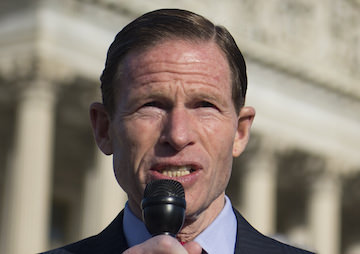Calling Out Sen. Blumenthal on Iran
Stanley Heller of the Middle East Crisis Committee responds to a legislative critic of the Obama-backed deal on Iran’s nuclear development.
By Stanley Heller

Sen. Richard Blumenthal, D-Conn. (AP / Molly Riley)
Below is a public, annotated message from Stanley Heller, executive director of the Middle East Crisis Committee, to U.S. Sen. Richard Blumenthal. In it, Heller reproduces a letter sent to him and others by Blumenthal and reacts to individual statements by the Connecticut Democrat.
Heller, whose inserted remarks are in bold type, takes issue with Blumenthal’s positions and actions concerning a deal with Iran on that nation’s nuclear development program. The senator split with President Barack Obama over how much influence Congress should have in the matter.
Heller’s letter has been edited slightly.
Dear Senator Blumenthal:
I’m very unhappy with your 4/29/15 letter defending your undermining of the president’s efforts to make an agreement on nuclear matters with Iran. Below I reprint your letter with my comments in bold.
Stanley Heller Executive Director, Middle East Crisis Committee
Friend, I have received many questions from constituents regarding my efforts to stop a nuclear-armed Iran, and I wanted to give you a full understanding of my work in the Senate on this important issue.
[Heller: You imply Iran has nuclear weapons. It has none and the U.S.’ National Intelligence Estimate determined in 2007 and 2010 that it had no nuclear weapons program.]
Reading and listening long and hard — in public forums, private conversations, and secure classified briefings — I am guided by two paramount goals: stopping a nuclear-armed Iran, and doing it by peaceful means.
An Iran with nuclear weapons would be an urgent, intolerable threat to American security.
[Heller: Wrong. Even if Iran were to make nuclear bombs its capacities would be dwarfed by U.S. abilities. Iran doesn’t have missiles or a navy with the ability to attack the U.S.A.]
Almost immediately, it would lead to the proliferation of such weapons throughout the Middle East, creating a nuclear tinderbox and endangering our allies, most obviously Israel.
[Heller: Israel, conspiring with France and the U.S., built nuclear weapons and now has hundreds. Iran’s capabilities are inspected while Israel’s actual nuclear bomb factories are not. Why don’t you even ask that Israel sign the nuclear non-proliferation treaty?]
I strongly support negotiations to stop this threat. That is why I advocated and helped lead legislation imposing severe economic sanctions on Iran — with the goal of bringing the Iranians to the table. After the sanctions succeeded, and talks began, I supported S. 269, the bipartisan Kirk-Menendez Bill, to strengthen sanctions if the talks failed. The result so far is a very general “framework” or “understanding,” which contains significant gaps and unanswered questions but is sufficient to continue the talks, which are now ongoing.
[Heller: Kirk-Menendez and the other bill that you sponsored, Corker-Menendez, were designed to destroy the talks with Iran in line with the desires of Netanyahu and AIPAC.]
I hope and believe these negotiations can succeed. Obstacles remain—complex issues concerning research and development on centrifuges, amounts of uranium, lifting of sanctions, and inspectors’ access to enrichment sites, to name a few. Surmounting these obstacles is certainly possible, albeit deeply challenging. Any final agreement must be airtight, comprehensive, and enduring — and, perhaps most importantly, strictly verifiable and enforceable. We can settle for nothing less.
[Heller: We remember the demands on Iraq to prove the negative that it had no weapons of mass destruction that led to the 2003 invasion. Whenever one inspection revealed nothing, the goalposts were pulled back and a new demand was made. We went to war and no WMD were found.]
Meeting this goal means that Congress must have a role in reviewing and scrutinizing any final agreement. The plain fact is that Congress imposed the sanctions by statute, and only Congress can permanently lift them. But even apart from constitutional requirements, Congress has a responsibility to make sure that this agreement squares with our enduring need for security and strong national defense, as I know well from my service on the Armed Services Committee. That is why I was an original and leading co-sponsor of the bipartisan S. 615, the Nuclear Agreement Review Act of 2015 (also known as the Corker-Menendez Bill), which was adopted unanimously in April 2015 by the Foreign Relations Committee after valuable modifications. The President’s acceptance of this measure reaffirms my support. I will continue to insist that Congress meet its responsibility.
[Heller: You successfully undermined him. Apparently he had no choice.]
Just as I appreciate the Administration’s steadfast perseverance and diligent work in these negotiations, I oppose any steps that would impede or, in my judgment, interfere with them. Even as the President has said that all options must be on the table—and I agree—our best option is diplomacy and other peaceful means. I support that effort.
[Heller: By “all options” you, of course, mean war, an unprovoked attack on Iran by Israel and the U.S., aggression, the gravest of war crimes. It should NOT be on the table.]
As always, I welcome your thoughts and views about these critically important issues. Hearing from you enables me to listen and learn.
Thank you,
Senator Richard Blumenthal
[Sen. Blumenthal’s email address is [email protected].]
Your support matters…Independent journalism is under threat and overshadowed by heavily funded mainstream media.
You can help level the playing field. Become a member.
Your tax-deductible contribution keeps us digging beneath the headlines to give you thought-provoking, investigative reporting and analysis that unearths what's really happening- without compromise.
Give today to support our courageous, independent journalists.






You need to be a supporter to comment.
There are currently no responses to this article.
Be the first to respond.